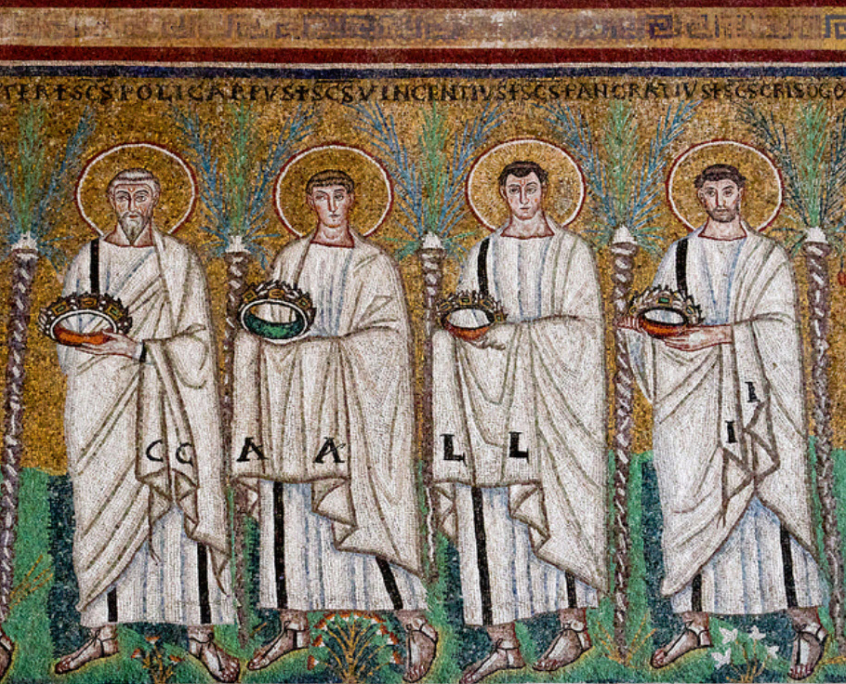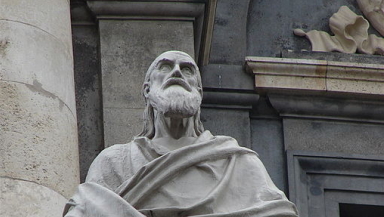
Today is the liturgical feast day of a man named Polycarp. Who was he?
Polycarp has become a legend of the early Church, most famous for his Christian courage and witness in the face of intense suffering. As the Church continues to suffer widespread persecution across the world today, the legacy of this saint is worth remembering. Here are three lessons from the life of Polycarp.
The early Church evangelist
Polycarp was made a bishop of Smyrna (modern day Izmir, Turkey) in AD 96. He is revered as an ancient Church father and saint across Catholic, Eastern Orthodox and Anglican traditions.
His story is particularly compelling because he lived so close to the time of Jesus and the apostles. Polycarp was converted in AD 80 by John the Evangelist, who also discipled and ordained him. His story is chronicled by Irenaeus, Tertullian and Saint Jerome.
For Irenaeus, Polycarp was a precious connection to the early Church and the life of Christ himself. He wrote in a letter to Florinus:
'I could tell you the place where the blessed Polycarp sat to preach the Word of God. It is yet present to my mind with what gravity he everywhere came in and went out; what was the sanctity of his deportment, the majesty of his countenance; and what were his holy exhortations to the people. I seem to hear him now relate how he conversed with John and many others who had seen Jesus Christ, the words he had heard from their mouths.'
Polycarp was also known for his battles with early heretics. He challenged Marcion, a Gnostic who undermined the authority of much the Old and New Testament scriptures. Polycarp didn't mince his words and called Marcion 'the first born of Satan'. He would go on to convert many from the heretical Gnostic tradition.
Grace under pressure
Polycarp was described by Ignatius as being clothed 'with the garment of grace' and would become famous for the serenity with which he faced his persecution. When at age 86 he learned that Roman authorities were to arrest him, he didn't run but waited at home. Friends urged him to flee, but after receiving a vision he insisted: 'I must be burned alive.'

When soldiers came to arrest Polycarp, he let them in, saying: 'God's will be done.' When interrogated by the local proconsul, he reportedly faced questioning with unfazed wit. Threatened with fire, he warned his aggressors of the eternal fire that faces the ungodly, and said: 'Why do you delay? Come, do what you will.'
Facing the fire
The bishop may be best known for his final moments as he faced a fiery death being burned at the stake.
When soldiers attempted to bind him to a stake he said: 'Leave me as I am. For he who grants me to endure the fire will enable me also to remain on the pyre unmoved, without the security you desire from nails.'
He prayed aloud and was consumed by the fire. A witness of the moment said his death was 'not as burning flesh but as bread baking or as gold and silver refined in a furnace'.
Polycarp was burned alongside 12 others. The date of his execution is unclear, being possibly in the years 155 or 156, or in 167 or 168 as Eusebius of Caesarea put it.
Authorities had demanded that he recant his Christian beliefs and burn incense in allegiance to the Emperor, but Polycarp refused.
'Eighty and six years I have served him, and He has done me no wrong', he said. 'How then can I blaspheme my King and Saviour? You threaten me with a fire that burns for a season, and after a little while is quenched; but you are ignorant of the fire of everlasting punishment that is prepared for the wicked.'
Polycarp has become emblematic of faith and conviction staying true in the face of great persecution. In his final moments, he reportedly said: 'I bless you Father for judging me worthy of this hour, so that in the company of the martyrs I may share the cup of Christ.'
You can follow @JosephHartropp on Twitter













